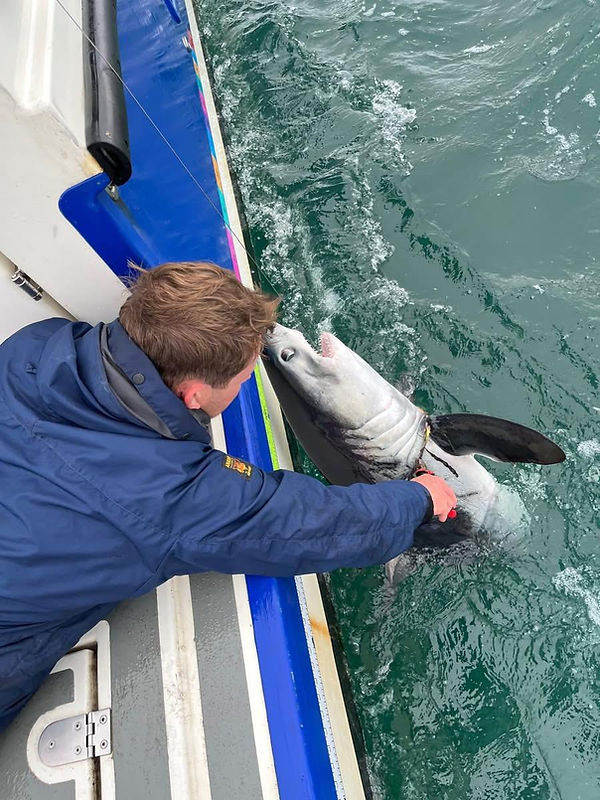Sadly, recreational anglers and charter skippers quite regularly find themselves removing plastic banding and fishing gear from sharks and other species during the year so the purpose of this section in our website is to draw attention to the damage discarded fishing gear and other debris can do to sharks and the many other species in the marine environment.
Plastic banding is particularly damaging and can be life changing for sharks as it ultimately cuts into their flesh leaving an open wound.
Commercial long line gear often use stainless hooks which unlike those used by the recreational sector, dont rust out, resulting in the fish dragging many yards of thick monofilament or worse still, wire trace.
If you come across a shark, or indeed any other fish which has become entangled in plastic banding, or other debris, or attached to commercial or recreational fishing gear please remove it and send us a picture with some brief details so we can log it and bring it to the attention of others.
Below is an example of a Porbeagle shark which Andrew Alsop, skipper of White Water in Milford Haven removed, before returning the shark alive.
The picture below shows recreational fishing gear which was attached to a Blue shark and removed by skipper Dan Margetts of Sowenna in Looe before returning tagging and releasing alive. This may have been the result of the shark eating a fish which was being wound up to the surface on this gear or perhaps it was discarded and the shark swam into it.
The picture below shows a commercial long line hook which skipper Murray Collings of Swallow II in Looe removed from a Blue shark before tagging and releasing it. Long line gear generally uses heavy monofilament line but in this case the hook was attached to wire, suggesting that this gear was being used to specifically target sharks.
The following day (see below) Murray removed a tuna circle hook attached to a length of fluorocarbon from a Blue shark. This most likely was caused by a shark taking a bait intended for tuna then biting the line to escape.
Recreational anglers play an incredibly important role in shark rescue work every year by removing plastic banding, netting, long line hooks and other detritus from sharks.
Our first shark rescue report in 2025 comes from Reel Deal Charters skipper Dan Hawkins and his crew.
When the lads brought a porbeagle boat side they immediately saw a loop of plastic banding around the sharks body which quickly cut away before releasing it at the side of the boat.
Congratulations and respect to all involved.
The recreational sector comes in for lots of criticism but it does a huge amount of good including swabbing, tagging and welfare work like this.
Its important we make these activities visible so the general public can see the good work we do so if anyone has any shark rescue stories please share them with us and we will post on the website.
The images below show the shark with the band attached and after it was removed
Great work Dan and crew!











